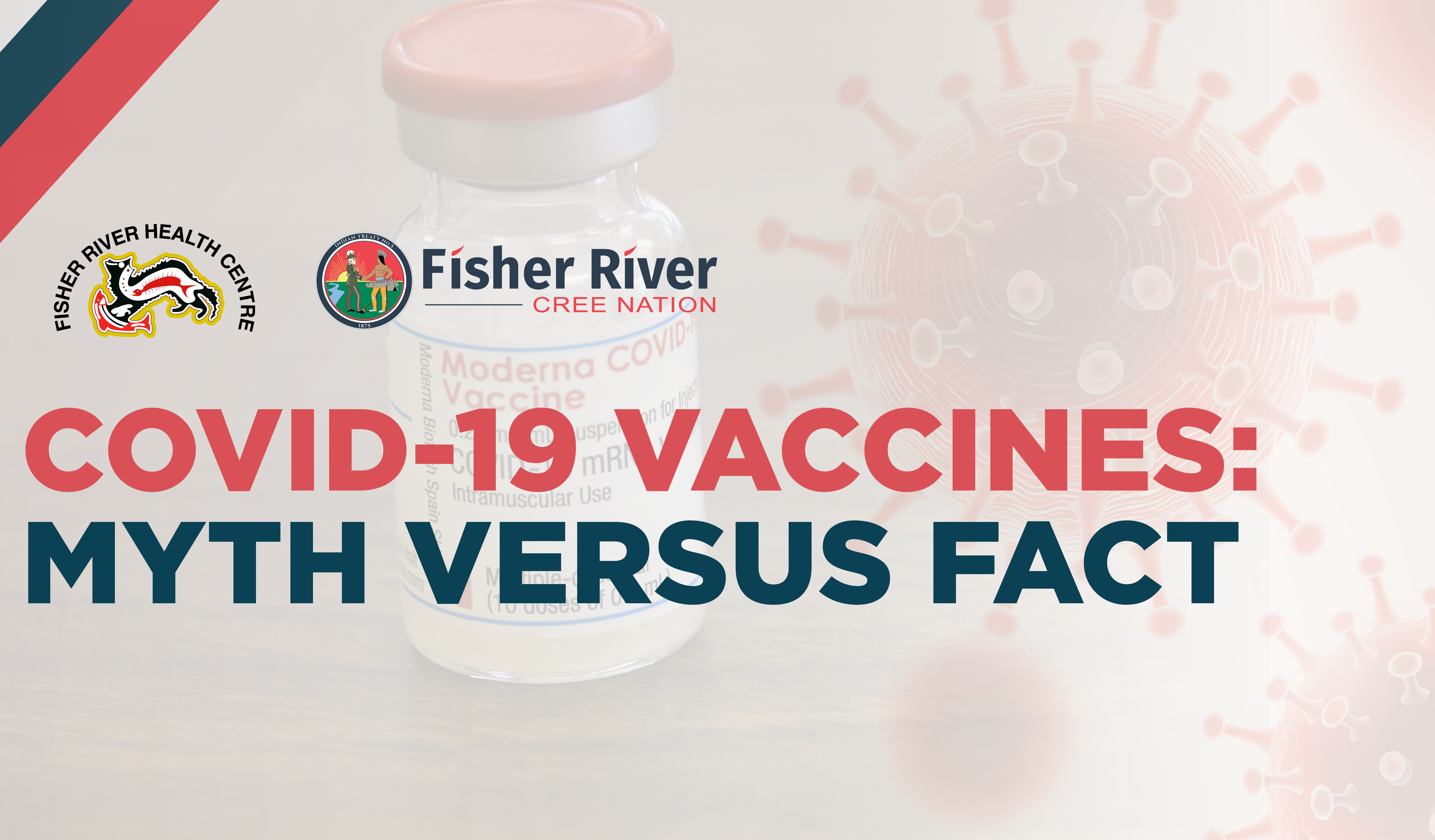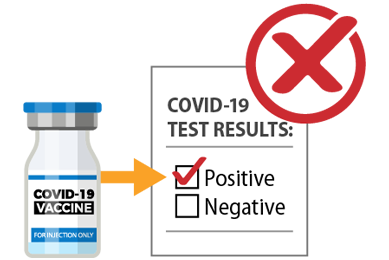MYTH: The COVID-19 vaccine can affect women’s fertility.
FACT: The COVID-19 vaccine will not affect fertility. The truth is that the COVID-19 vaccine encourages the body to create copies of the spike protein found on the coronavirus’s surface. This “teaches” the body’s immune system to fight the virus that has that specific spike protein on it.
Confusion arose when a false report surfaced on social media, saying that the spike protein on this coronavirus was the same as another spike protein called syncitin-1 that is involved in the growth and attachment of the placenta during pregnancy. The false report said that getting the COVID-19 vaccine would cause a woman’s body to fight this different spike protein and affect her fertility. The two spike proteins are completely different and distinct, and getting the COVID-19 vaccine will not affect the fertility of women who are seeking to become pregnant, including through in vitro fertilization methods. During the Pfizer vaccine tests, 23 women volunteers involved in the study became pregnant, and the only one who suffered a pregnancy loss had not received the actual vaccine, but a placebo.
Getting COVID-19, on the other hand, can have potentially serious impact on pregnancy and the mother’s health. Learn more about coronavirus and pregnancy. Johns Hopkins Medicine encourages women to reach out to their medical providers to discuss other questions they have about COVID-19 as it relates to fertility or pregnancy.
MYTH: If I’ve already had COVID-19, I don’t need a vaccine.
FACT: People who have gotten sick with COVID-19 may still benefit from getting vaccinated. Due to the severe health risks associated with COVID-19 and the fact that re-infection with COVID-19 is possible, people may be advised to get a COVID-19 vaccine even if they have been sick with COVID-19 before.
There is not enough information currently available to say if or for how long people are protected from getting COVID-19 after they have had it (natural immunity). Early evidence suggests natural immunity from COVID-19 may not last very long, but more studies are needed to better understand this. Several subjects in the Pfizer trial who were previously infected got vaccinated without ill effects. Some scientists believe the vaccine offers better protection for coronavirus than natural infection.
MYTH: Researchers rushed the development of the COVID-19 vaccine, so its effectiveness and safety cannot be trusted.
FACT: Studies found that the two initial vaccines are both about 95% effective — and reported no serious or life-threatening side effects. There are many reasons why the COVID-19 vaccines could be developed so quickly. Here are just a few:
- The COVID-19 vaccines from Pfizer/BioNTech and Moderna were created with a method that has been in development for years, so the companies could start the vaccine development process early in the pandemic.
- China isolated and shared genetic information about COVID-19 promptly, so scientists could start working on vaccines.
- The vaccine developers didn’t skip any testing steps, but conducted some of the steps on an overlapping schedule to gather data faster.
- Vaccine projects had plenty of resources, as governments invested in research and/or paid for vaccines in advance.
- Some types of COVID-19 vaccines were created using messenger RNA (mRNA), which allows a faster approach than the traditional way that vaccines are made.
- Social media helped companies find and engage study volunteers, and many were willing to help with COVID-19 vaccine research.
- Because COVID-19 is so contagious and widespread, it did not take long to see if the vaccine worked for the study volunteers who were vaccinated.
- Companies began making vaccines early in the process — even before FDA authorization — so some supplies were ready when authorization occurred.
MYTH: Getting the COVID-19 vaccine means I can stop wearing my mask and taking coronavirus precautions.
FACT: Individuals who get the COVID-19 vaccination still need to practice infection prevention precautions. Keep your mask on, and continue staying at least 6 feet from people outside your household, until further notice. Vaccines do not stop the coronavirus from entering your body; they only prevent you from developing moderate to severe COVID-19. It’s not yet clear if people vaccinated for COVID-19 can still carry and transmit the virus, even when they themselves don’t get sick.
MYTH: Getting the COVID-19 vaccine gives you COVID-19.
FACT: The vaccine for COVID-19 cannot and will not give you COVID-19. The two authorized mRNA vaccines instruct your cells to reproduce a protein that is part of the SARS-CoV-2 coronavirus, which helps your body recognize and fight the virus, if it comes along. The COVID-19 vaccine does not contain the SARS-Co-2 virus, so you cannot get COVID-19 from the vaccine. The protein that helps your immune system recognize and fight the virus does not cause infection of any sort.
MYTH: The side effects of the COVID-19 vaccine are dangerous.
FACT: The COVID-19 vaccine can have side effects, but the vast majority are very short term —not serious or dangerous. The vaccine developers report that some people experience pain where they were injected; body aches; headaches or fever, lasting for a day or two. These are signs that the vaccine is working to stimulate your immune system. If symptoms persist beyond two days, you should call your doctor.
If you have allergies — especially severe ones that require you to carry an EpiPen — discuss the COVID-19 vaccine with your doctor, who can assess your risk and provide more information about if and how you can get vaccinated safely.
MYTH: The COVID-19 vaccine enters your cells and changes your DNA.
FACT: The two COVID-19 vaccines available to us are designed to help your body’s immune system fight the coronavirus. The messenger RNA from two of the first types of COVID-19 vaccines does enter cells, but not the nucleus of the cells where DNA resides. The mRNA does its job to cause the cell to make protein to stimulate the immune system, and then it quickly breaks down — without affecting your DNA.
MYTH: The messenger RNA technology used to make the COVID-19 vaccine is brand new.
FACT: The mRNA technology behind the new coronavirus vaccines has been in development for almost two decades. Vaccine makers created the technology to help them respond quickly to a new pandemic illness, such as COVID-19.
MYTH: The COVID-19 vaccine was developed with or contains controversial substances.
FACT: The first two COVID-19 vaccines to be authorized by the FDA contain mRNA and other, normal vaccine ingredients, such as fats (which protect the mRNA), salts, as well as a small amount of sugar. These COVID-19 vaccines were not developed using fetal tissue, and they do not contain any material, such as implants, microchips or tracking devices.
MYTH: Now that we have a vaccine for COVID-19, we can make vaccines for the common cold, HIV and other diseases.
FACT: The thousands of viruses that cause various diseases are very different. Many change (mutate) year by year, making it difficult to develop one vaccine that works for a long period of time.
Developing vaccines for some disease-causing viruses is tough. For example, the virus that causes HIV can hide and make itself undetectable by the human immune system, which makes creating a vaccine for it extremely difficult.
The common cold can be caused by any one of hundreds of different viruses, so a vaccine for just one of them would not be very effective.
MYTH: After getting a COVID-19 vaccine, will I test positive for COVID-19 on a viral test?
No. Neither the recently authorized and recommended vaccines nor the other COVID-19 vaccines currently in clinical trials in the United States can cause you to test positive on viral tests, which are used to see if you have a current infection.
If your body develops an immune response—the goal of vaccination—there is a possibility you may test positive on some antibody tests. Antibody tests indicate you had a previous infection and that you may have some level of protection against the virus. Experts are currently looking at how COVID-19 vaccination may affect antibody testing results.
MYTH: The COVID-19 vaccine was developed to control the general population either through microchip tracking or “nanotransducers” in our brains.
Fact: There is no vaccine microchip, and the vaccine will not track people or gather personal information into a database.
This myth started after comments made by Bill Gates from The Gates Foundation about a digital certificate of vaccine records. The technology he was referencing is not a microchip, has not been implemented in any manner and is not tied to the development, testing or distribution of COVID-19 vaccines.
To learn more about the Moderna Vaccine, please call Fisher River Health Services at 204.645.2689 or 431.256.0395.






